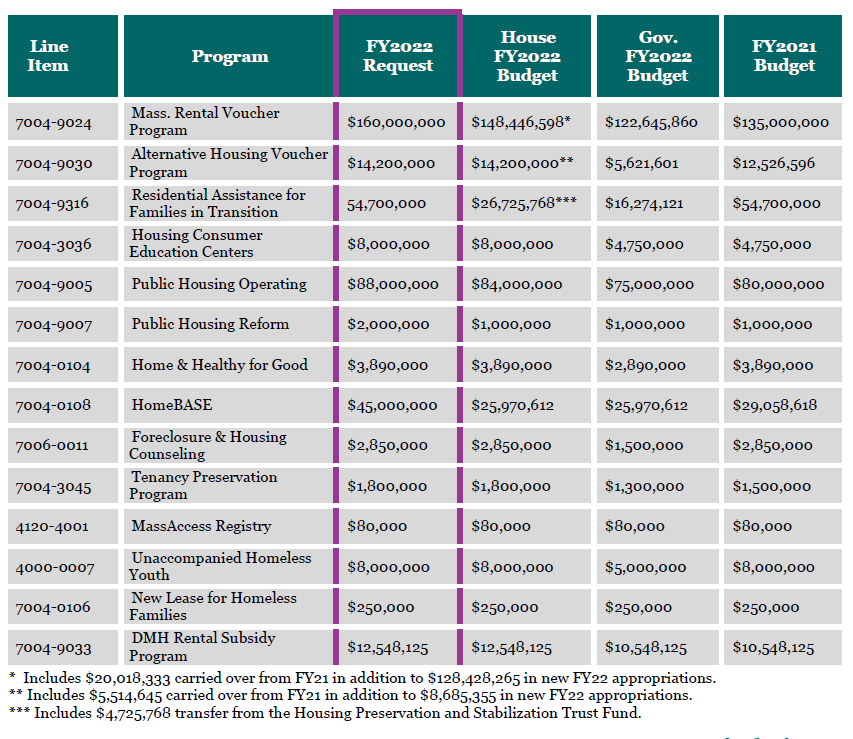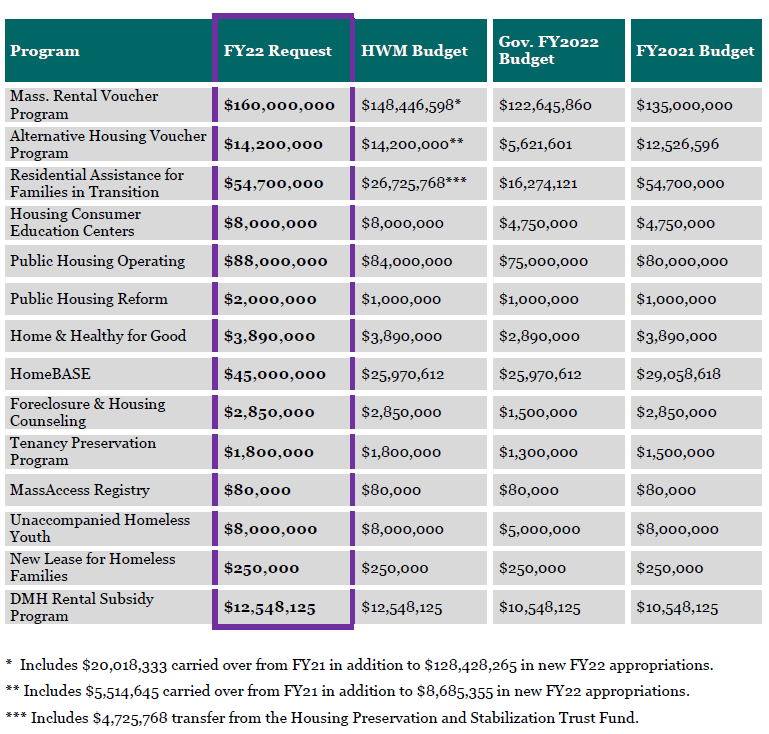by iwd Tina | May 3, 2021 | Housing News
During the early hours of April 29, the Massachusetts House of Representatives concluded debate on its FY2022 state budget proposal. The budget includes strong investments in CHAPA’s affordable housing priorities. The House proposed increases for Massachusetts Rental Voucher Program (MRVP), Alternative Housing Voucher Program, Public Housing, Housing Consumer Education Centers, the Tenancy Preservation Program, and DMH Rental Subsidies.
The House also included an important program change for RAFT which will allow applicants to access up to $10,000 in emergency housing assistance beyond the COVID-19 emergency. The House budget also allows families to access the maximum benefits for both RAFT and HomeBASE, if eligible.
Unfortunately, the amendments advocated for by CHAPA on MRVP, HomeBASE, and Community Preservation Act recording fees for affordable housing were not adopted during the budget debate. CHAPA thanks all the Representatives who sponsored and co-sponsored these amendments.
Thanks to Speaker Mariano, House Ways and Means Chair Michlewitz, and all House members for supporting affordable housing, homelessness prevention, and community development resources in the final House FY2022 state budget proposal!
The State Senate will debate its budget proposal this May. Please stay tuned on the next steps for the senate budget advocacy!
Table of FY2022 Priorities in House Budget

by iwd Tina | Apr 30, 2021 | Housing News
On April 30, the Massachusetts Department of Housing and Community Development (DHCD) posted a Request for Responses (RFR) for a Fair Housing Initiative.
DHCD is soliciting proposals from eligible respondents to provide fair housing advocacy and services across Massachusetts. DHCD’s primary objectives for this Initiative are:
- Increasing housing choice for voucher holders across the state
- Addressing gaps in funding for fair housing enforcement under the State’s anti-discrimination law, ch. 151B, particularly public/rental assistance recipiency
- Addressing lead paint discrimination
- Addressing co-occurring discriminatory bases, including race, national origin, and familial status
DHCD plans to use up to $500,000 per year over an initial three-year pilot period in Moving To Work Block Grant funding flexibility to award funding to a selected fair housing enforcement agency or agencies to identify fair housing compliance and enforcement issues across privately-owned housing in DHCD’s jurisdiction, investigate discriminatory practices, and provide enforcement assistance for households with a housing voucher.
Additionally, the funding will be used to develop best practices and education for low-income households and owners regarding fair housing including but not limited to advertising and outreach, as well as educational offerings on fair housing rights and responsibilities. The clients served under this activity may include households with housing assistance vouchers outside of the participants in DHCD’s Housing Choice Voucher Program.
Responses are due no later than 4:00PM on Wednesday, June 16, 2021. Responses received after that date and time will not be considered. This RFR has been posted on the Commonwealth’s procurement and solicitation system, COMMBUYS.
by iwd Tina | Apr 22, 2021 | Housing News
by iwd Tina | Apr 14, 2021 | Housing News
On April 14, 2021, the House Committee on Ways and Means released its FY2022 state budget proposal. The proposal provides increased funding for many of CHAPA’s affordable housing budget priorities, including for the Massachusetts Rental Voucher Program, the Alternative Housing Voucher Program, Public Housing, Housing Consumer Education Centers, the Tenancy Preservation Program, and DMH rental subsidies.
House Ways and Means Chair Michlewitz highlighted affordable housing programs in his budget letter, writing:
“In FY21, one of the main funding priorities of the House was in the area of housing and homelessness. That budget funded programs like the Rental Assistance for Families in Transition (RAFT) and Massachusetts Rental Voucher Program (MRVP) at historically high levels. As we move into the FY22 budget, we plan to continue to prioritize these needs and build on previous investments to support individuals, families, and youth. In tandem with an anticipated $800 million in Federal rental assistance funds, this budget will create hundreds of new vouchers that will be utilized to keep at risk families in their homes, particularly important during COVID. Other housing programs and homeless shelters for both individuals and families will also see significant investments.”
CHAPA’s full language analysis of our budget priorities also includes a description of changes made to the program language. For RAFT, these changes include making the $10,000 benefit cap extend beyond the COVID-19 emergency and allowing households to access the maximum benefits for both RAFT and HomeBASE, if eligible.
Representatives have until Friday, April 16, to file amendments to the budget proposal. The House will then debate and finalize its budget proposal the week of April 26. Please stay tuned for action alerts on how you can take action to help make the strongest possible budget for affordable housing, community development, and homelessness prevention!
The Senate will then debate its state budget proposal in May.
Overview of CHAPA Budget Priorities

by iwd Tina | Apr 6, 2021 | Housing News
CHAPA Virtual Housing Day 2021 Materials
We’re excited to come together virtually with housing advocates to support the policies and resources needed for everyone in Massachusetts to have a safe, healthy, and affordable home. To join us at Housing Day on April 6th from 10 A.M. to 11 A.M., please use this Zoom link.
Legislation Fact Sheets
by iwd Tina | Apr 2, 2021 | Housing News
On April 2, 2021, the Baker-Polito Administration announced that $400 million in new federal funding for the Eviction Diversion Initiative to increase emergency rental and utility assistance to low-income renters. The additional funding, and the flexibility created by federal regulations, will allow the Department of Housing and Community Development to expand aid to more households, provide deeper and longer-term assistance to households, and help households with utility payments.
The new Emergency Rental Assistance Program (ERAP) funds will:
- Expand Income Eligibility – households making up to 80% of Area Median Income (AMI) will be eligible for funding (RAFT has an eligibility threshold of 50% AMI).
- Longer-term Assistance – households may be eligible for up to 12 months of rental arrears (plus an extra 3 months of stipends for future rent if funding allows and need is demonstrated), as well as overdue utilities arrears up to $1,500. All rent and utility arrears must have been accrued after 3/13/20. Currently, RAFT and ERMA can provide up to $10,000 per household for rental arrearages or stipends.
- Prioritization of funds for those most at risk, including those making less than 50% AMI and those unemployed for 90 days or more.
In addition, DHCD, in partnership with MassHousing and the Massachusetts Housing Partnership, will launch a new program to allow qualified owners of income-restricted units, as well as Local Housing Authorities, to apply for help directly on behalf of all of their income-eligible residents with past-due rent. The Subsidized Housing Emergency Rental Assistance (SHERA) program will expedite relief for eligible tenants while also allowing administering agencies to concentrate on applications from non-subsidized tenants in need of assistance.
Federal resources will also be made available to families who are eligible for Emergency Assistance (EA) Shelter, by coupling ERAP rental assistance benefits with the existing HomeBASE benefit and housing services. This will help those who owe arrears and are at risk of becoming unhoused, and also those who are exiting EA shelter and transitioning into permanent housing. The Administration is also pursuing two pilot initiatives: the first will allow municipalities to provide targeted outreach and hands-on ERAP application support to communities with demonstrated need and hard-to-reach populations, and the second provides targeted outreach strategies to small landlords about the availability of ERAP and other state financial assistance programs.


